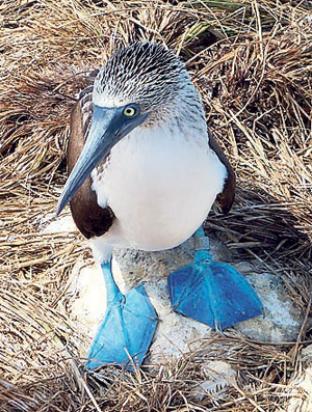Published in the Ocean Watch column, Honolulu Star-Advertiser © Susan Scott
December 10, 2012
ISLA ISABELA, MEXICO » In 1988 when visiting the Galapagos Islands, I met my first blue-footed boobies. The seabirds nested nearly everywhere on the ground there, some raising their chicks right in the middle of paths trod by countless human visitors. Occasionally, if you stepped a bit close to a nest, a parent booby would deliver a jab toward an ankle with an indignant squawk, as if saying, “Watch yourself, Sasquatch.There are kids playing here.”
 Photo by Susan Scott
Photo by Susan Scott
Blue Footed Booby
I was so smitten by the birds’ feistiness, and their blue-foot two-step, I wanted to plop down on the trail and watch for hours.Our tour guide had other plans. Someday, I vowed, I will find a blue-footed booby colony on my own and watch these feathered darlings to my heart’s content.
Not knowing much about them at the time, I had no idea how hard it would be to deliver on that promise.
Blue-footed boobies nest in the Galapagos and on only three other islands off the west coast of Mexico where I am right now. I had my sailboat, Honu, here once before, but only briefly because a storm chased me away. This time, though, the weather is calm and settled, meaning I can spend all the time I want watching and admiring blue-footed boobies.

The seabirds, about 30 inches long with 5-foot wingspans, have cinnamon-brown feathers cut with distinct white streaks. The colors and patterns are stunning enough, but good grief, those huge swim-fin feet! Sky blue is their average color, and the hues go up and down from there, like color chips on a paint card. My favorite is lagoon turquoise, a pigment so bright the birds’ feet practically shimmer in the sun.
The boobies use their big webbed feet in a mating ritual that looks more like a high-five than a dance. When a potential mate ambles past, a bird balances on one foot and raises the other as high as it can and, often with a whistle (male) or a honk (female), shows the object of its affection the sole. A moment later the bird shifts its weight, and up comes the other foot.
If the courted bird likes what it sees, it too starts flashing its feet. Blue-footed boobies reminded me of barely balanced 2-year-olds trying to show each other their shiny new sneakers.

Some birds are so full of courting energy, they can barely walk around without kicking up a heel. I spotted one bird this week, all alone, high-stepping over and over, apparently practicing for its moment of glory.
While reading about blue-footed boobies, I learned that the Galapagos birds are a subspecies of the ones here in Mexico, their colors being slightly different. Now I’ve made myself another promise. Someday I will go back to the Galapagos to appreciate nature’s full palette of cinnamon-striped heads and blushing blue feet.